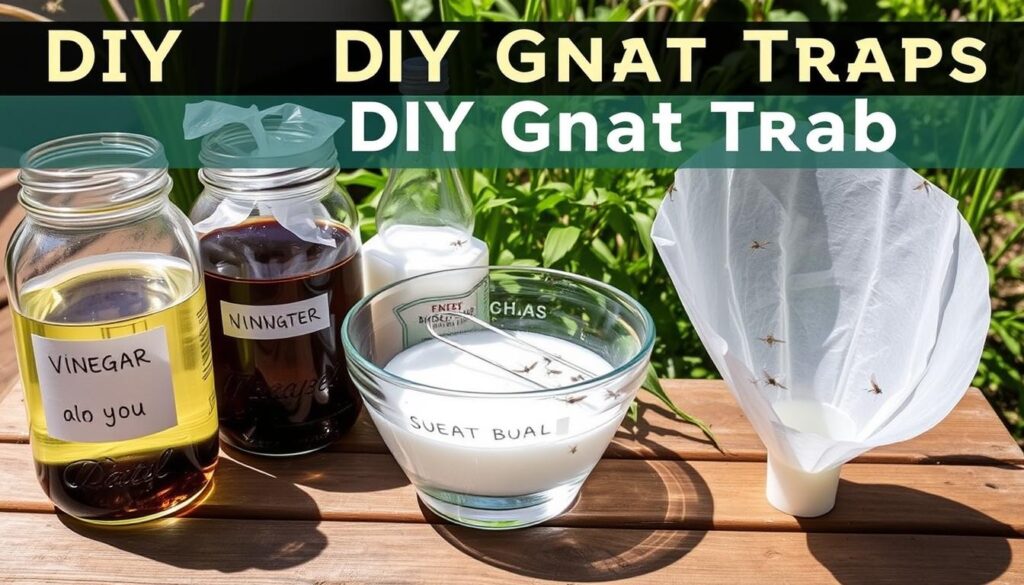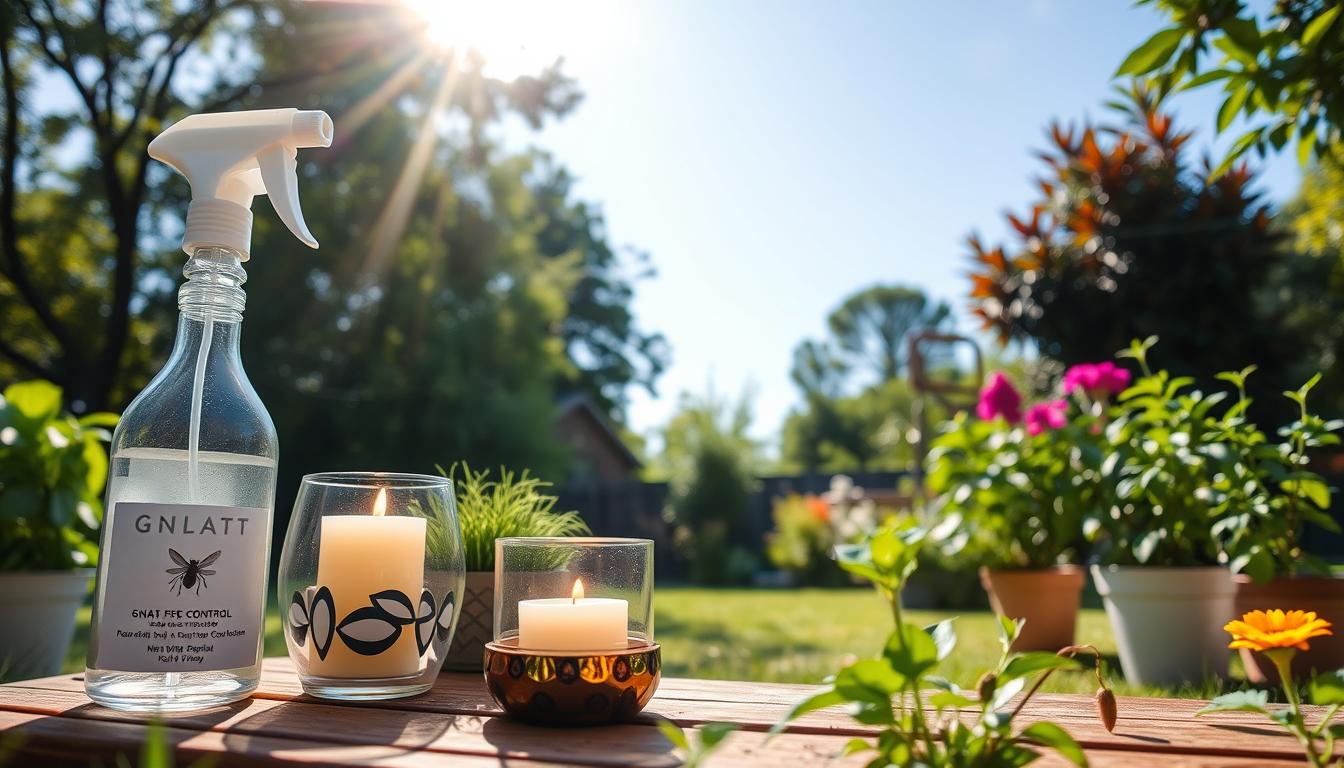Eliminate Gnats Outside Ever swat at Gnats in your backyard? These tiny flies can ruin a nice outdoor time. But, there’s a way to get rid of them for good. We’ll show you how to keep your yard gnat-free.
Key Takeaways
- Gnats can be a common nuisance in outdoor areas, especially in damp or moist environments
- Effective gnat control strategies involve eliminating breeding sites, using natural repellents, and applying targeted insecticides
- Landscaping modifications and professional pest control can also help prevent and eliminate outdoor gnat infestations
- Temporary solutions like traps and DIY methods can provide quick relief from gnat swarms
- Maintaining a clean, dry outdoor environment is key to preventing future gnat problems
Table of Contents
What Are Gnats?
Gnats are tiny flying insects that belong to the order Diptera, which includes flies. They have slender bodies and elongated wings. They are often found in moist environments. Gnats thrive in temperatures between 75 and 80°F and can be a nuisance both indoors and outdoors.
Types of Gnats
There are several common types of gnats you may encounter:
- Fungus gnats – These small, dark-winged flies are attracted to damp soil. They can transmit diseases to outdoor plants if their numbers are high.
- Fruit flies – These small flies hover around overripe or decaying fruit. They can be found in kitchens.
- Drain flies – Also known as moth flies, these tiny flies gather in humid areas. This includes kitchen pipes, bathrooms, and basements.
Regardless of the type, gnats are attracted to warm, damp environments. They breed on decaying organic matter and moisture. Knowing the different types of gnats can help you identify and address the specific issue you’re facing.
“Gnats are attracted to humid and damp environments. So, fixing leaking pipes and maintaining proper drainage is essential for controlling their population.”
Causes of Outdoor Gnat Infestations
Gnats are tiny flying insects that can be a big nuisance. They are attracted to moist soil, decaying organic matter, and standing water. These conditions are perfect for them to breed and multiply.
Infected plants or potted plants with damp soil can bring gnats outside. If you’ve added a new plant, it might have gnat eggs or larvae. Fungus gnats, for example, prefer moist soil and are often found near mushrooms and fungi.
Commercial greenhouses are also a common source of gnats. The moist soil, plenty of food, and warm temperatures make them a perfect home for gnats. This leads to large gnat populations.
| Common Gnat Sources | Key Attractants |
|---|---|
| Infected plants | Moist soil, decaying organic matter |
| Commercial greenhouses | Moist soil, warm temperatures |
| Drain pipes and sinks | Standing water, rotting food debris |
| Compost piles | Decaying organic matter |
Gnats are also attracted to standing water, like clogged drains or pet water bowls. Drain flies, for example, live in moist places like sink and floor drains. They feed on the organic matter there.
To fight outdoor gnat infestations, you need to know their breeding grounds. Fixing moisture issues, and removing decaying matter, and other attractants helps control gnats. This way, you can keep them away from your home.
Remove Breeding Sites
To control gnats outside, start by getting rid of their breeding sites. Gnats love moist soil, decaying matter, and standing water. These places are perfect for them to lay eggs and grow. To stop gnats, you must remove these breeding spots.
Start by clearing away fallen leaves, debris, and yard waste. This organic material can rot and attract gnats. Also, clean up any overripe fruits or veggies that have fallen. Gnats are attracted to the smell of rotting food.
Don’t overwater your lawn and plants. Too much water in the soil is great for gnat larvae. Try adjusting your watering or using better drainage systems to avoid puddles.
- Remove fallen leaves, debris, and yard waste to eliminate decomposing organic matter
- Clean up overripe fruits and vegetables that have dropped to the ground
- Adjust watering schedules to prevent waterlogged soil and standing water
- Install drainage systems in areas prone to moisture buildup
| Product | Price |
|---|---|
| Greenkeeper Sticky Traps | $7 |
| Masontops Trap Caps – 4 Count | $12 |
| Fly Paper | $3 |
| Apple Cider Vinegar Trap | $7 |
| Diluted Bleach | $6 |
| Candle Flame Trap | $17 (32% off) |
| Insect Control | $14 (17% off) |
By getting rid of gnat breeding sites, you can stop infestations and reduce gnat numbers outside. Keeping up with maintenance and watching for gnats is crucial.
“The key to controlling gnats outside is to eliminate their breeding grounds. By removing organic matter, fixing drainage issues, and preventing excess moisture, you can make your yard much less appealing to these pests.”
Use Natural Gnat Repellents
Managing outdoor gnats can be done in an eco-friendly way. Planting certain herbs and flowers is a simple method. Herbs like basil, catnip, chives, lavender, lemongrass, mint, and rosemary repel gnats with their scents.
Attracting natural predators is another approach. Adding bats, birds, hoverflies, ladybugs, and ground beetles to your yard can help control gnats. Also, reducing artificial lighting makes your yard less appealing to gnats, as they prefer brighter areas.
Combining natural repellents, attracting predators, and adjusting lighting can effectively manage gnats. This method is good for the environment and your outdoor space.
“Gnats are a nuisance, but there are plenty of natural ways to keep them at bay and maintain a peaceful outdoor environment.”
Apply Insecticides
Dealing with gnat infestations outdoors can be tough. Chemical treatments like broad-spectrum insecticides can help fast. Use pyrethrin sprays or granules to kill gnats at all life stages. These chemical gnat treatments can really cut down the gnat numbers.
To tackle gnat larvae, try larvicides. They stop larvae from growing into adult fungus gnats. This method can help stop the problem from coming back.
When using gnat insecticides, make sure not to spray on flowers or where bees are. It’s important to apply them right and at the right time. This way, they work best without harming other insects.
“Chemical treatments are a reliable solution for stubborn gnat infestations, providing rapid relief by eliminating the pests in multiple life stages.”
Using natural repellents and changing your landscaping can also help. By fixing the root causes and using chemical gnat treatments when needed, you can clear your outdoor areas of lawn gnats.
Landscaping for Gnat Control
Keeping your landscape well-designed and drained is key to fighting lawn gnats. Knowing what attracts these pests helps you use smart landscaping to keep them away.
Improve Drainage
Gnats love moist spots, so better drainage is vital. Think about adding French drains or raised beds to stop water from pooling. Make sure your soil drains well and don’t water too much.
Mindful Mulching
Mulch is great for your garden but use it wisely to avoid attracting gnats. Choose a thin layer to prevent moisture buildup that gnats like.
Maintain Your Landscape
Regular upkeep, like clearing leaves and cutting back plants, helps get rid of gnat breeding spots. A neat landscape is less inviting to gnats.
| Landscaping Technique | Benefits for Gnat Control |
|---|---|
| Improving Drainage | Prevents waterlogged conditions that attract gnats |
| Mindful Mulching | Avoids creating a moist environment that gnats prefer |
| Consistent Landscape Maintenance | Removes potential breeding grounds and food sources for gnats |
Using these landscaping tips can make your outdoor space less welcoming to gnats. This helps keep your area pest-free.

“Proper landscape design and maintenance are key to preventing and controlling outdoor gnat infestations.”
Rely on Professional Pest Control
Managing stubborn gnat infestations can be tough. It’s often best to rely on professional pest control services. These experts have the knowledge, tools, and treatments needed to get rid of gnats from your outdoor spaces.
Professional gnat control services can figure out how bad the problem is. They can also tell you which type of gnat you have. They have strong insecticides and treatments that you can’t buy yourself. By hiring an exterminator for gnats, you can make sure your outdoor areas are gnat-free without the hassle.
Professional pest control companies don’t just get rid of gnats. They also help prevent future problems. They can find and fix the things that attract gnats, like standing water or decaying matter. This way, your outdoor spaces can stay gnat-free for a long time.
“Gnats can be a real nuisance, but with the help of a professional exterminator, you can get rid of them quickly and effectively. Their expertise makes all the difference in eliminating a stubborn gnat problem.”
If gnats are a problem in your yard or garden, consider getting help from a professional pest control company. Their professional gnat control services can solve your problem. This way, you can enjoy your outdoor spaces without the annoyance of gnats.
Temporary Gnat Control Methods
Dealing with gnats can be frustrating. Luckily, there are quick ways to control them. These methods can help you feel better fast.
One simple DIY trap uses apple cider vinegar and dish soap. Mix them in a bowl and place it near gnats. The vinegar draws them in, and the soap traps them. It’s a fast way to catch adult gnats.
Essential oils like eucalyptus or lavender can also help. Spray them around your outdoor area or on your skin. They keep gnats away. You can also use citronella candles or incense to make your yard gnat-free.
Adhesive traps are another strong option. They stick to adult gnats, reducing their numbers quickly. Place these traps in your outdoor spaces for the best results.
For more intense control, bug zappers or outdoor fans can help. The moving air and electric zapping keep flying gnats away.
While these methods offer quick relief, it’s key to solve the root of the problem. Fixing breeding sites and using long-term solutions is crucial. Combining quick fixes with lasting measures helps manage gnats and enjoy your outdoor areas.

| Quick Gnat Control Solution | Effectiveness | Ease of Use | Cost |
|---|---|---|---|
| Vinegar and Dish Soap Trap | High | Easy | Low |
| Essential Oil Sprays | Moderate | Easy | Low |
| Adhesive Traps | High | Moderate | Moderate |
| Bug Zapper | High | Easy | Moderate |
| Outdoor Fans | Moderate | Easy | Low |
“Nearly 10 flies were caught within an hour of setting up the homemade gnat trap using white vinegar and liquid dish soap.”
How to Get Rid of Gnats Outside
To get rid of gnats outside your home, you need a few steps. First, find and remove any places where gnats like to breed. This includes moist soil, rotting plants, and standing water. Use natural gnat repellents like herbs and essential oils.
Also, change your yard’s design to make it less welcoming to gnats. This means reducing moisture and creating a less hospitable space for them.
If gnats keep coming back, you might need to use insecticides or call a professional pest control expert. Using a mix of these methods can help you enjoy your outdoor areas without gnats.
Keeping your yard clean is also key. Regularly take out the trash and store food properly. This helps prevent attracting gnats to your yard. By tackling the problem at its source and using different solutions, you can eliminate gnat infestations in the yard. This makes your outdoor space more enjoyable.

